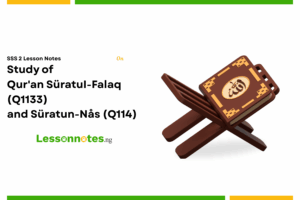Islamic Moral Education III – Personal Hygiene & Cleanliness in Islam SS3 Islamic Studies Lesson Note
Download Lesson Note
Lesson Notes
Topic: Islamic Moral Education III – Personal Hygiene & Cleanliness in Islam
PERSONAL HYGIENE AND ENVIRONMENTAL SANITATION.
DISCUSSION:
Taharah is the Arabic word for purification or cleanliness
- Taharah – Cleanliness, Ghusl – Ritual Bath, Siwaak – Local brush, Imaan – Faith, Fitrah – Local disposition.
- Neatness means to take care of every part of the body through washing the body, mouth, teeth, feet and nose. Clean environment involves keeping hoes and compounds clean through sweeping, cutting grass and fumigation.
- In Islam, neatness and cleanliness of the environment is considered as half of the Faith. The Prophet (SAW) was reported to have said: “Cleanliness or Purity is half of Faith.” Hadith no.23, an – Nawawi’s collection.
- Also: “Using miswaak to clean the mouth is a way to reach the Divine pleasure.”
- Q.74:4-5, Surah al – Muddathir reads: “And purify your garments and keep away from dirt (worship of idols)”.
- Q.2:222, Surah al – Baqarah: “Truly Allah (SWT) loves those who turn to Him in repentance and loves those who purify themselves.”
KINDS OF CLEANLINESS IN ISLAM.
- Spiritual Cleanliness: this involves: Purifying the heart from bad feelings, thoughts and behaviours against our fellow beings.
- To avoid jealousy, grudges, hatred or backbiting. The Holy Prophet (SAW) encouraged spiritual cleanliness by saying: “In the body there is a piece of flesh, if it is good the whole body is good, if it is bad the whole body is bad. Truly it is the heart.
- Also, Hadith no. 23 says that the heart can be clean through constant repentance to Allah (SWT).
2. Physical Cleanliness: this is involved.
- keeping all parts of the body and cloth clean like teeth, nostrils, nails, and armpits. Also by regular baths.
- Keeping the environment clean through sweeping and cutting of grass.
- Prophet Muhammad (SAW) said: “The key to prayers is cleanliness.”
- Narrated by Abu Dawud. Purity is half of Faith.” Hadith no. 23.
Examples of how to maintain Neatness and Clean Environment.
- Taking regular baths.
- Doing miswak (brushing) regularly.
- Keeping clothes and body clean.
- Using fragrance or perfume.
- Keeping our house, street and environment clean.
- Avoid indiscriminate passing of urine and spitting.
From Abu Hurayrah, may Allah (SWT) be pleased with him reported that the Prophet (SAW) said: “Five practices are of the Fitrah (Natural Disposition):
- Circumcision.
- Shaving the pubic region.
- Clipping the nails.
- Cutting the moustache short.
Benefits of Personal Hygiene and Environmental Sanitation
- it leads to Allaah’s (SWT) reward for obeying His Commandments and following the Sunnah of the Prophet (SAW).
- It leads to a healthy, strong and long life.
- It leads to Integrity, Respect and Love from our friends and neighbours.
- It encourages our friends and neighbours to learn and follow us.
SMOKING CIGARETTES.
DISCUSSION:
- Smoking cigarettes involves lighting of tobacco which contains harmful chemicals such as nicotine then inhaling it through the nose resulting in smoke released out through the nose and mouth. It is done with pipes or cigars (i.e. a rolled bundle of dried fermented tobacco leaves for smoking).
- Moral education is teaching children and young people to acquire values and behaviours regarding what is right and wrong.
- The Holy Qur’an did not specifically prohibit or condemn the smoking of cigarettes but gives behavioural guidance.
- Islam condemns smoking cigarettes as harmful as a result of severe health damage that leads to death and it involves waste of money.
- Verses and Hadith on smoking cigarettes include:
- Q.2:195 – Surah al – Baqarah.
- Q.3:29 – Surah al – Imran
- Q.4:29 – Surah an – Nisa’i.
- Q.7:31 – Surah al – Araf.
- Q.17:26,27 – Surah al – Israa’il.
- The prophet (SAW) was reported to have said: “All intoxicants are forbidden in Islam.” Sahih Bukhari.
- The minimum punishment for smoking cigarettes is 40 lashes as well as prison time.
Islamic ways of preventing smoking cigarettes include:
- Niyyah (Intention) making an intention from deep inside the heart to give up this evil habit.
- Religious teachings and seminars should be arranged to combat smoking in society.
- Need for government legislation to ban the production, selling and smoking of tobacco.
- Increased awareness and enlightenment of people concerning the danger of smoking on health and lives.
- Individual smokers should be encouraged to avoid situations and people who do so around them.
- A smoker should keep himself busy and avoid things that bring about an urge.





















